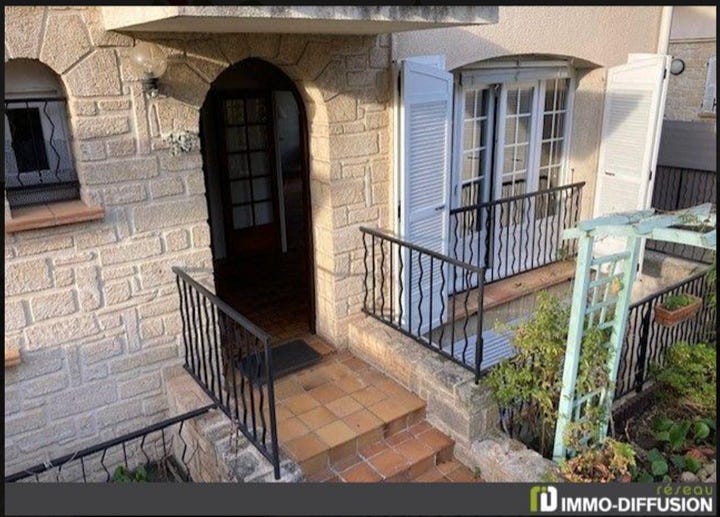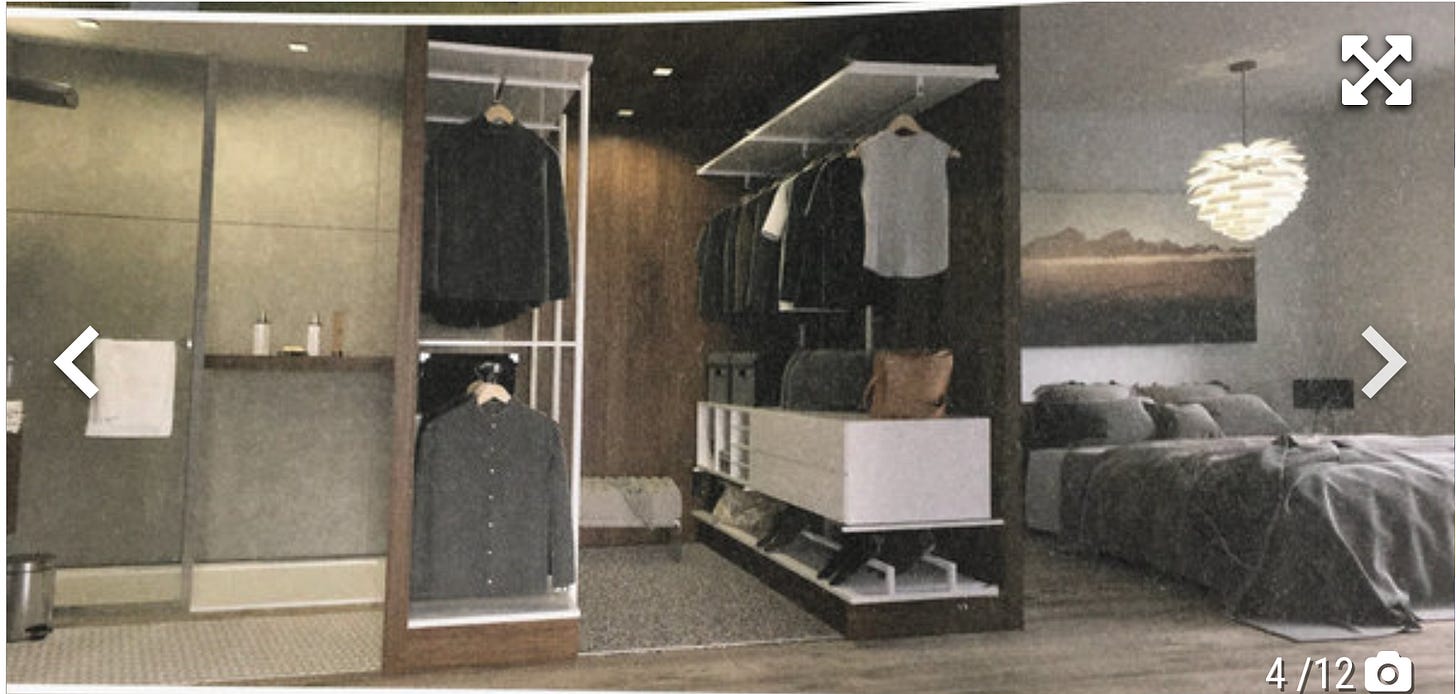Looking at Real Estate in France part one
A bizarre online journey
After deciding we liked Montpellier, Carolyn and I quickly decided that we were after an appartement, not a maison (freestanding house) for the simple reason that we thought (as part-time residents) maintenance of an apartment would be easier to handle from afar. If something went wrong (a pipe bursting, a leaky roof, a raccoon infestation) we would have neighbors to complain about it alert us.
We were excited and we began scouring several sites*. We were thrown by the photographs of the properties for sale—the quality was awful and there weren’t nearly enough to get a real feel for the spaces (the food is lousy and the portions are too small!) It was is if the real estate agents told everyone, “We’re shooting your apartment on Monday, so be sure to close the curtains, we want the space as DARK as possible, leave your coffee table cluttered—it creates a sense of mystery—buyers like that, leave them wanting more. Oh, and for God’s sake no healthy plants anywhere in the apartment!”
Everything appeared very . . . lived in. The French don’t pretend that they exist in a state of tidy perfection. There is also a strong local sense of privacy, which might explain why a listing would have three photographs of the terrace and nothing else.




The effect was so jarring that we began gravitating towards the “under construction” properties that have slick drawings of floor plans and idealized renderings full of lush plants and beaming sunlight. The new developments were really tempting with their generous bathrooms, bike storage, expansive terraces looking over bike filled parks, and American-style kitchens (as far as I can tell that just means the clothes washer isn’t in the kitchen, and you can fit a side of beef in your gigantic refrigerator).
As we considered the new builds more carefully they started to feel like a gamble. We asked a realtor friend in Austin who happens to be a French citizen, “Can they raise the price after we pay a deposit?”
“Of course they can!”
“Okay, what if the war in Ukraine ends next year, and they start rebuilding and you can’t get glass, or concrete, or steel in France, or what if there’s a labor shortage because all the skilled workers have moved to Ukraine?”
“That’s a risk.”
“Well, if we pay our deposit and the development company goes out of business, can we get our money back.”
“Maybe, someday. Probably not.”
An existing property seemed safer and probably faster. Many people dream of renovating an old property à la Under the Tuscan Sun. Carolyn and I both read chef David Lebovitz’s wonderfully terrifying book, L’appart: The Delights and Disasters of Making My Paris Home and were quickly convinced that we didn’t want a renovation project (the book is heavier on the disasters than the delights). But we also learned some quirks about how the French real estate market operates compared to the US market. For instance, the process of completing a purchase is very slow and involves a government official called a notaire instead of an attorney or title company. In France, there is no equivalent to the Multiple Listing Service (MLS) whereby an agent can show a buyer almost anything that’s for sale. Some sellers list their properties with several agents, some with only one and buyers have to check several agencies to get a comprehensive picture of what’s on the market. You will have to look at a lot of websites, but it’s mostly fun work.
In addition to the atomized market, the terminology the French use to describe spaces was completely unfamiliar to us. First of all, space is quantified in square meters, not square feet, but this is a fairly easy conversion to make. I got in the habit of just multiplying square meters by 11 to give me an idea of the size of the various apartments in square feet (1 square meter = 10.76 square feet). Some key terminology for French real estate listings:
Size: the French have several ways of describing the size of an apartment. The two we saw most are surface habitable which is the general size of the living area, not including interior walls, and the surface Loi Carrez which is defined by law and must be provided by the seller. Loi Carrez is the usable floor area excluding pipe chases, door swing areas, areas with ceiling height less than 1.8m, etc. The Loi Carrez measurement is legally important. A buyer has up to a year to demand a reduction in the price if the measurement is off by more than 5%!
Apartment types: many of the apartments listed were described as T1, T2,T3 or T4. The T stands for taille (size), so a T1 apartment is a studio (one room apartment), T2 is a one bedroom apartment, T3 is a two bedroom, etc. The digits in the name are a count of the pièces or rooms but don’t include the kitchen or bathrooms. You might also see a variation of the T number written as 3p which is simply 3 pièce.
Bathroom names: the French custom of separating toilets into their own rooms (WCs) separate from bathing rooms made this a bit of a puzzle to decipher. You might see listings with SDB (salle du bain) which is a bathroom with a sink and tub or tub/shower, SDD (salle de douche) a bathroom with a sink and shower, or salle d’eau which is a room with a WC and sink. We started our search certain that we wanted two full bathrooms so that guests could have their privacy but quickly realized we needed to adjust our desire to fit with the local custom of the separate WC. The most common arrangement for the size apartment we were after seemed to be two bathing spaces (SDB and/or SDD) and one WC. Our French friend claims that she is still grossed out by the presence of a toilet in the bathing area.
Carolyn and I were constantly texting each other listings—bizarre photos that made us laugh, exquisite properties we could never afford, old estates that were too remote but too beautiful not to share, and a few that looked like they might be right for us. Carolyn joined an expat Montpellier site on Facebook. She scoured the message boards about what neighborhoods were safe or trendy or had the best quality of life. This last bit was frustrating, for every person who said a given neighborhood was dangerous and full of gang/drug activity, another person would say the opposite.
We decided that we’d just have to visit lots of properties in different neighborhoods and decide for ourselves. In our next newsletter we’ll talk about the agent we found and worked with and our experiences seeing actual apartments in Montpellier.
Jusqu’à la prochaine fois (until next time)
Carolyn & Roberto
* Real estate sites and resources
https://www.home-hunts.com/blog/hidden-costs-of-buying-property-in-france/
https://www.davidlebovitz.com/how-to-buy-an-apartment-in-paris-property-group/
BTW - all Amazon links are affiliate links. We’re trying to pay for a new French home five cents at a time.




What about [URL] https://apartamentobrasil.com/ [/URL]
[URL]https://moosecasaitalia.com/[/URL]